TO
| Creator | Title | Description | Subject | Date | ||
|---|---|---|---|---|---|---|
| 1 |
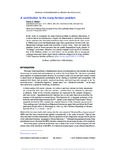 | Mattis, Daniel C. | A contribution to the many-fermion problem | In this work we reexamine the many-fermion problem in arbitrary dimensions. It is shown that in two dimensions or higher, the Hamiltonian of interacting fermions can be separated into individual nonintersecting sectors labeled by the wave-vector q. Within each sector the Hamiltonian maps onto a gene... | 2012-01-01 | |
| 2 |
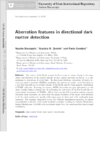 | Gondolo, Paolo | Aberration features in directional dark matter detection | The motion of the Earth around the Sun causes an annual change in the mag-nitude and direction of the arrival velocity of dark matter particles on Earth, in a way analogous to aberration of stellar light. In directional detectors, aberration of weakly interacting massive particles (WIMPs) modulates ... | 2012-01-01 | |
| 3 |
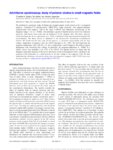 | Rogachev, Andrey | Admittance spectroscopy study of polymer diodes in small magnetic fields | We performed a systematic study of bipolar and unipolar organic diodes based on the p-conjugated polymer, 2-methoxy-5-(20-ethylhexyloxy) (MEH-PPV), using electronic and magneto-transport measurements with magnetic field in the range 0-180mT and admittance spectroscopy in the frequency range 1 Hz<f<1... | 2012-01-01 | |
| 4 |
 | Mattis, Daniel C. | An expanded Luttinger model | This paper generalizes Luttinger's model by introducing curvature (d2ε (k) dk2 ≠ 0 ) into the kinetic energy. An exact solution for arbitrary interactions is still possible in principle, but it now requires disentangling the eigenvalue spectrum of an harmonic string of interacting boson fields at... | 2012-01-01 | |
| 5 |
 | Saam, Brian | Asymptotic and intermediate long-time behavior of nuclear free induction decays in polycrystalline solids and powders | Free induction decay (FID) measured by nuclear magnetic resonance (NMR) in a polycrystalline solid is the isotropic average of the FIDs for individual single crystallites. It has been recently proposed theoretically and verified experimentally that the long-time behavior of single-crystal FIDs has t... | 2012-01-01 | |
| 6 |
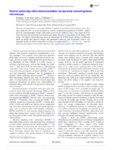 | Williams, Clayton C. | Atomic scale trap state characterization by dynamic tunneling force microscopy | Dynamic tunneling force microscopy (DTFM) is applied to the study of point defects in an inter-layer dielectric film. A recent development enables simultaneous acquisition of DTFM, surface potential, and topographic images while under active height feedback control. The images show no clear correlat... | 2014-01-01 | |
| 7 |
 | Mishchenko, Eugene | Attraction-repulsion transition in the interaction of adatoms and vacancies in graphene | The interaction of two resonant impurities in graphene has been predicted to have a long-range character with weaker repulsion when the two adatoms reside on the same sublattice and stronger attraction when they are on different sublattices. We reveal that this attraction results from a single energ... | 2014-01-01 | |
| 8 |
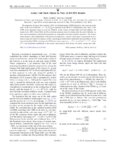 | Gondolo, Paolo | Axion cold dark matter in view of BICEP2 results | The properties of axions that constitute 100% of cold dark matter (CDM) depend on the tensor-to-scalar ratio r at the end of inflation. If r ¼ 0.20 þ0.07 −0.05 as reported by the BICEP2 Collaboration, then "half" of the CDM axion parameter space is ruled out. Namely, in the context of single-fie... | 2014-01-01 | |
| 9 |
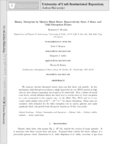 | Bromley, Benjamin C. | Binary disruption by massive black holes: hypervelocity stars, S stars, and tidal disruption events | We examine whether disrupted binary stars can fuel black hole growth. In this mechanism, tidal disruption produces a single hypervelocity star (HVS) ejected at high velocity and a former companion star bound to the black hole. After a cluster of bound stars forms, orbital diffusion allows the black ... | 2012-01-01 | |
| 10 |
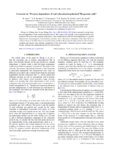 | Saam, Brian | Comment on pressure dependence of wall relaxation in polarized 3He gaseous cells | Zheng et al. [Zheng, Gao, Ye, and Zhang, Phys. Rev. A 83, 061401(R) (2011)] have measured a strong linear pressure dependence of the nuclear relaxation rate of 3He in glass cells typically used to generate and/or store polarized 3He at room and cryogenic temperatures. Their interpretation is that th... | 2012-01-01 | |
| 11 |
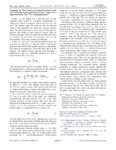 | Saam, Brian | Comment on: New limit on lorentz-invariance- and CPT-violating neutron spin interactions using a free-spin-precession 3He- 129Xe comagnetometer | In Ref. [1], the authors use a classical result for the magnetic field created by a uniform magnetization to analyze the effects of magnetic interactions between 3He and 129Xe nuclear spins. We point out that the classical result is not applicable for interaction between nuclear spins: the actual in... | 2014-01-01 | |
| 12 |
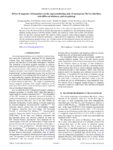 | Gerton, Jordan | Effect of magnetic Gd impurities on the superconducting state of amorphous Mo-Ge thin films with different thickness and morphology | We studied the effect of magnetic doping with Gd atoms on the superconducting properties of amorphous Mo70Ge30 films. We observed that in uniform films deposited on amorphous Ge, the pair-breaking strength per impurity strongly decreases with film thickness initially and saturates at a finite value ... | 2012-01-01 | |
| 13 |
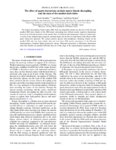 | Gondolo, Paolo | The effect of quark interactions on dark matter kinetic decoupling and the mass of the smallest dark halos | The kinetic decoupling of dark matter (DM) from the primordial plasma sets the size of the first and smallest DM halos. Studies of the DM kinetic decoupling have hitherto mostly neglected interactions between the DM and the quarks in the plasma. Here we illustrate their importance using two framewor... | 2012-01-01 | |
| 14 |
 | Wu, Yong-Shi | Emergent exclusion statistics of quasiparticles in two-dimensional topological phases | We demonstrate how the generalized Pauli exclusion principle emerges for quasiparticle excitations in 2D topological phases. As an example, we examine the Levin-Wen model with the Fibonacci data (specified in the text), and construct the number operator for fluxons living on plaquettes. By numerical... | 2014-01-01 | |
| 15 |
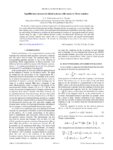 | Mishchenko, Eugene | Equilibrium currents in chiral systems with nonzero Chern number | We describe a simple quantum-mechanical approach to calculating equilibrium particle current along the edge of a system with nontrivial band spectrum topology. The approach does not require any a priori knowledge of the band topology and, as a matter of fact, treats topological and nontopological co... | 2014-01-01 | |
| 16 |
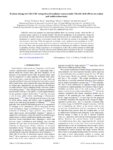 | Lupton, John Mark | Exciton storage in CdSe/CdS tetrapod semiconductor nanocrystals: electric field effects on exciton and multiexciton states | CdSe/CdS nanocrystal tetrapods are interesting building blocks for excitonic circuits, where the flow of excitation energy is gated by an external stimulus. The physical morphology of the nanoparticle, along with the electronic structure, which favors electron delocalization between the two semicond... | 2012-01-01 | |
| 17 |
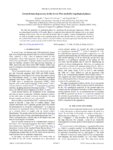 | Wu, Yong-Shi | Ground-state degeneracy in the Levin-Wen model for topological phases | We study the properties of topological phases by calculating the ground-state degeneracy (GSD) of the two-dimensional Levin-Wen (LW) model. Here it is explicitly shown that the GSD depends only on the spatial topology of the system. Then we show that the ground state on a sphere is always nondegener... | 2012-01-01 | |
| 18 |
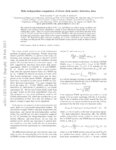 | Gondolo, Paolo | Halo independent comparison of direct dark matter detection data | We extend the halo-independent method of Fox, Liu, and Weiner to include energy resolution and efficiency with arbitrary energy dependence, making it more suitable for experiments to use in pre-senting their results. Then we compare measurements and upper limits on the direct detection of low mass (... | 2012-01-01 | |
| 19 |
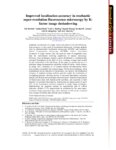 | Gerton, Jordan | Improved localization accuracy in stochastic super-resolution fluorescence microscopy by K-factor image deshadowing | Localization of a single fluorescent particle with sub-diffraction-limit accuracy is a key merit in localization microscopy. Existing methods such as photoactivated localization microscopy (PALM) and stochastic optical reconstruction microscopy (STORM) achieve localization accuracies of single emitt... | 2014-01-01 | |
| 20 |
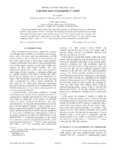 | Gondolo, Paolo | Light dark matter in leptophobic Z' models | Recent experimental results in direct dark matter detection may be interpreted in terms of a dark matter particle of mass around 10 GeV=c2. We show that the required scenario can be realized with a new dark matter particle charged under an extra Abelian gauge boson Z0 that couples to quarks but not ... | 2012-01-01 | |
| 21 |
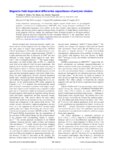 | Rogachev, Andrey | Magnetic-field dependent differential capacitance of polymer diodes | Using admittance spectroscopy, we found that bipolar organic diodes based on pi-conjugated polymer, 2-methoxy-5-(20-ethylhexyloxy), MEH-PPV, have strong divergent contribution to the device differential capacitance. It is positive at low bias voltages, turns negative at intermediate biases, and beco... | 2012-01-01 | |
| 22 |
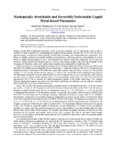 | Vardeny, Zeev Valentine | Mechanically stretchable and reversibly deformable liquid metal-based plasmonics | We demonstrate that liquid metals are attractive materials for active plasmonic devices at terahertz frequencies. Using a liquid metal injected into an elastomeric mold, we measure the static and stretched transmission properties of aperture arrays. | 2012-01-01 | |
| 23 |
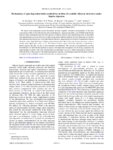 | Lupton, John Mark | Mechanisms of spin-dependent dark conductivity in films of a soluble fullerene derivative under bipolar injection | We report room-temperature pulsed electrically detected magnetic resonance measurements of the dark conductivity of films of the fullerene derivative [6,6]-phenyl-C61-butyric acid methyl ester (PCBM) under bipolar (electron-hole) and unipolar (electron-rich) injection conditions. Directly after mate... | 2014-01-01 | |
| 24 |
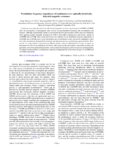 | Boehme, Christoph | Modulation frequency dependence of continuous-wave optically/electrically detected magnetic resonance | Continuous-wave optically and electrically detected magnetic resonance spectroscopy (cwODMR/cwEDMR) allow the investigation of paramagnetic states involved in spin-dependent transitions, like recombination and transport. Although experimentally similar to conventional electron spin resonance (ESR), ... | 2012-01-01 | |
| 25 |
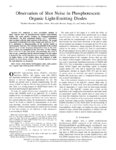 | Rogachev, Andrey | Observation of shot noise in phosphorescent organic light-emitting diodes | We employed a cross correlation method to study current noise in phosphorescent organic light-emitting diodes. The noise spectra revealed two frequency-dependent components. The first component displays 1/ f 1.3 dependence and correlates with the light emission of the devices. The second component i... | 2014-01-01 |
